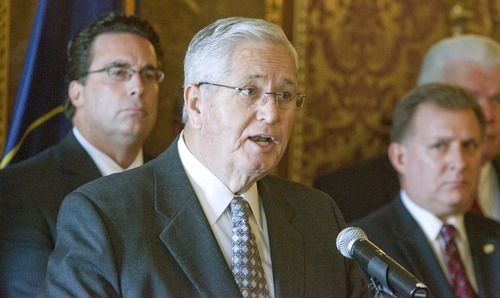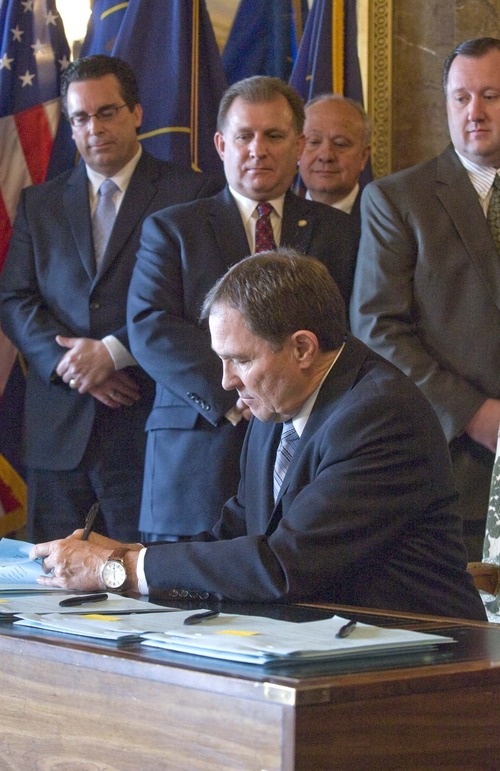This is an archived article that was published on sltrib.com in 2011, and information in the article may be outdated. It is provided only for personal research purposes and may not be reprinted.
The LDS Church stepped from the sidelines on immigration reform and squarely onto the playing field Tuesday by sending Presiding Bishop H. David Burton to attend and speak at Gov. Gary Herbert's signing ceremony for four bills passed by the Utah Legislature.
"Our presence here testifies to the fact that we are appreciative of what has happened in the Legislature this session," Burton said at the signing, indicating it was no accident or private decision. "We feel the Legislature has done an incredible job on a very complex issue."
Burton, who oversees the Utah-based church's financial affairs, joined key legislators, business leaders, activists and religious figures such as Utah Episcopal Bishop Scott Hayashi and homeless advocate Pamela Atkinson in the Capitol's Gold Room for the signing.
Burton's presence was an extraordinarily public endorsement for the LDS Church, which typically prefers to work in the background. And it has supporters and critics from within the faith scrambling to know how to react.
One thing is clear: The Church of Jesus Christ of Latter-day Saints has abandoned its claims to neutrality on these bills.
And that surprised many who have been told repeatedly by the church's spokesmen that it had no position and that its lobbyists, Bill Evans and John Taylor, were on Capitol Hill solely to answer questions.
Though Evans and Taylor assured Ron Mortensen, an ardent opponent of illegal immigration, that the church wasn't actively lobbying on the issue, the two "spent literally the last 10 days in the back alleys of the Capitol, like full-time fixtures," Mortensen said. "It wouldn't have taken that much time to say the church is neutral."
Both supporters and opponents agree that the church's endorsement of the Utah Compact and its involvement in the legislative process was a game-changer.
If the Utah Legislature had been in session right after Arizona passed its stringent immigration law, the Beehive State "likely would have gotten the same thing," said Paul Mero, president of the conservative Sutherland Institute.
But with LDS Church support for immigration reform, Mero said, "We've had a 180[-degree] turn in this state. Culturally, more and more folks understand how reasonable comprehensive reform is compared to enforcement only."
Sen. Stuart Reid, R-Ogden, echoed that sentiment.
"There is no question that the Utah Compact, with the church's endorsement, made a significant difference to me and others in the Legislature who helped craft immigration legislation,"
Reid, Senate sponsor of HB116, a guest-worker bill, said in an e-mail, "It provided the inspiration for our efforts to negotiate and compromise, enabling us to create principle-based legislation the majority of the Legislature eventually supported."
More than 80 percent of Utah lawmakers are LDS.
But it has left faithful Mormons who support strict enforcement of immigration laws grappling with the message from their ecclesiastical leaders.
"I am shocked that the church would support a bill that literally sacrifices 50,000 Utah children, who are the victims of identity theft, for the benefit of illegal aliens," Mortensen said. "The church has sent so many conflicting messages, I just don't know where they are coming from."
It hasn't destroyed his faith in the church, he said. "My faith is stronger than that, but it disappoints me."
Arturo Morales-LLan, head of Legal Immigrants for Immigration Law Enforcement, supports the enforcement-only bill by Rep. Stephen Sandstrom, R-Orem.
He said he won't believe that the church supports these reform efforts until he sees an official statement from the LDS First Presidency itself.
"David Burton has a right to be present or to be involved in any affairs concerning the faith," Morales-LLan said, "but he does not speak for the First Presidency."
The Latino activist said he met with Herbert shortly after the signing ceremony and that the governor assured him that Burton was there as an invited guest and the church had "no involvement" in the bills.
That has left Morales-LLan feeling confused with what he sees as the church's conflicting messages — to obey the law or support what he sees as "amnesty" for lawbreakers.
Latino activist Tony Yapias was pleased and surprised by Burton's participation.
"This is something unprecedented that should send a message to members," Yapias said. "It says that now the church wants to be more active in the immigration issue. They can't be selective about where they show up."
The debate is vital to Utah's Latino population, many of whom are LDS. Yapias and others estimate that 50 percent to 75 percent of members in Utah's 100-plus Spanish-speaking congregations are undocumented. That includes many bishops, branch presidents, even stake presidents. The church sends missionaries among undocumented immigrants across the country, baptizing many of them without asking about their status. It also allows them to go to the church's temples and on missions.
Sen. Ross Romero, D-Salt Lake City, didn't support the immigration bills, arguing that immigration is a federal — not state — issue. But the first Latino minority leader in the Legislature said he was happy to see "a more compassionate" approach than the original enforcement-only efforts. He applauds his own religious leader, Utah Catholic Bishop John Wester, for his outspoken defense of undocumented immigrants.
He also welcomes the LDS Church's support of the bills and hopes that support will be what people across the nation see, rather than the anti-illegal immigration statements by church members Russell Pearce, the Arizona Senate sponsor of that state's harsh law, and conservative talk-show host Glenn Beck.
"The church would want to make clear that [Pearce and Beck] may be of the religion but don't speak for the religion," Romero said. "David Burton's presence at the signing is a reflection that this is [the church's] view and where they stand."
LDS Church and immigration
The Church of Jesus Christ of Latter-day Saints had endorsed The Utah Compact, a set of principles supporting a humane approach to immigration reform, but it did not sign the document. And it has taken a publicly neutral stance on immigration bills that were debated, reworked and ultimately passed in the recent legislative session. That changed Tuesday when Presiding Bishop H. David Burton praised the Legislature for doing an "incredible job" on the issue and saying his presence at the bill-signing ceremony "testifies" to the church's appreciation for the outcome. —
LDS Church statement
The church's public relations department posted this blog that it says clarifies its position on Utah's immigration legislation.





